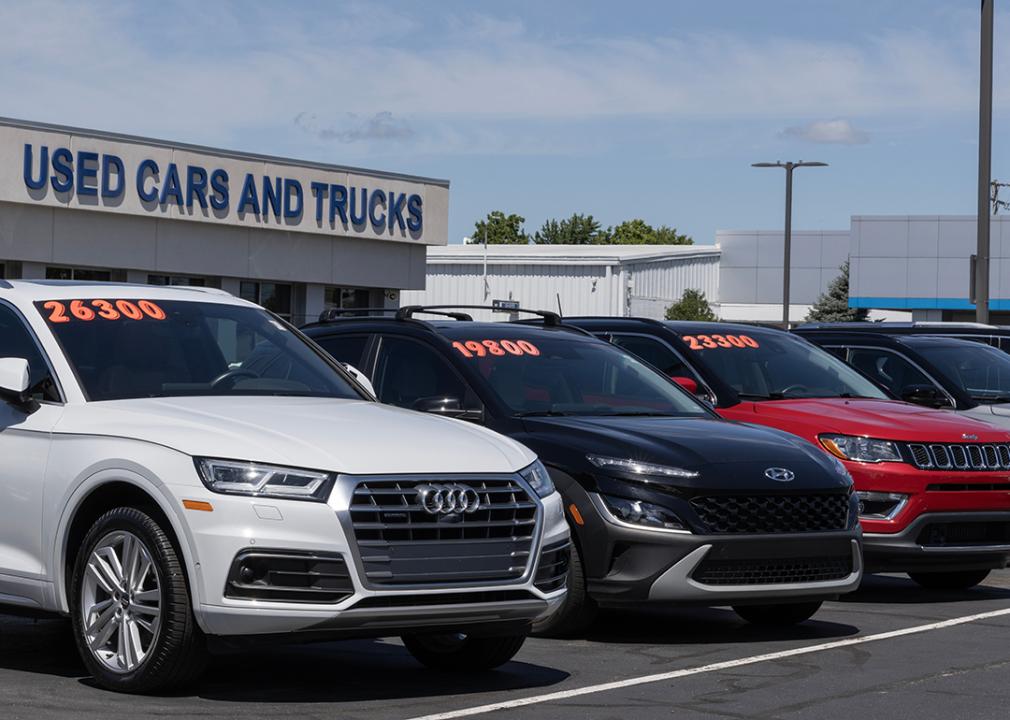
When it comes time to get rid of your old car, you might wonder: "Should I sell my car to a dealer or privately?" Selling privately is more likely to get you the best price. At the same time, the convenience and speed of selling to a dealer might also be your top priorities. If you're hoping to sell your car, using a dealer can be a great option. CarGurus details what to know about selling your car to a dealer, and how it compares with selling your car online or privately.
Are you noticing signs it's time to sell your car? Here are some advantages and drawbacks to selling your vehicle to a dealership:
Pros
Cons
When you research your car's value online, you will likely be presented with three numbers:
Private party sales are when you sell to an individual and handle the entire process yourself. The general rule is that selling a car this way can be difficult, and certainly involves more effort than selling to a dealer. However, private party sales are typically the most lucrative way to sell your car, so this is an excellent way to get top dollar if you're willing to put in the extra legwork.
While not guaranteed, if you want to sell your car to help pay for a new vehicle, trading in toward a new vehicle from the same dealership can potentially get you more money than you'd get by simply selling it to the same dealer.
This is because a trade-in gives the dealer a chance to sell a car as well as buy one, in turn moving them closer to monthly or quarterly sales targets. If trading in, remember to not only negotiate the trade-in value, but also the balance that you'll be due to pay on your new vehicle. Trading in can lower your out-of-pocket purchase expenses up front and, if you're paying on finance, will ultimately lower your monthly payment too. You may also get a better interest rate if you're financing since the down payment reduces your loan amount.
Selling your car online offers similar convenience to selling to a dealer but with the advantage of getting a range of offers. What's more, some online selling platforms—including CarGurus—will offer your car to local dealers as part of the instant offer process. Sellers are then given two options: accept the local dealer offer, in which case they'll then need to take their vehicle to the dealer for an appraisal and to complete the sale; or, sell fully online, in which case a collection will be arranged. In either instance, using the online route will ensure you are guided through the process.
Whether you're selling to a dealer, to a private party, or online, here are some steps to take as you prepare to sell your vehicle:
1. Gather the relevant paperwork. Locate the car's title, because you'll need to hand it over to the new owner. Also track down any servicing and maintenance details, the car's handbook and, if your car is still under warranty, locate the warranty paperwork; a vehicle still under warranty will be more attractive to buyers. If selling privately, a vehicle history report will provide insight that may appeal to buyers.
2. Write down important details. Write down your car's make, model, trim, and odometer reading. If you plan to post a vehicle listing or get an instant online offer, you'll need to include these details. If your car has optional or aftermarket equipment, note down those features as well.
3. Get the car ready for sale. Remove personal items and clean the exterior and interior. First impressions matter in the sales process, so ensure your vehicle looks its best.
How do I sell my car to a dealership for the most money?
Shopping around is essential if you want to sell your current car to a dealership for the most money. The payout may vary from dealer to dealer, so visit more than one to improve your chances for getting a great deal.
Does it make sense to fix a car before selling?
If the cost of repairs exceeds the value of your car, it doesn't make sense to fix your vehicle before selling. If the repairs cost significantly less than your car's value, fixing your car may make it more appealing to buyers. However, you'll need to decide if it's worth the hassle.
What should you know before selling your car?
Before selling your car, know you have options. You could sell privately, sell or trade it to a dealer, or sell it online via an instant cash offer. And what if you've leased your car? You can sell a leased car to a private buyer or a dealership.
How honest should you be when selling a car?
You must be honest when selling a car. If you sell to a private party and you're dishonest about the car's condition or problems, they could sue you if they learn you've been deceptive during the sales process.
This story was produced by CarGurus and reviewed and distributed by Stacker Media.